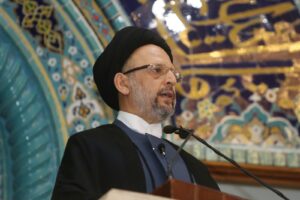Punishment is for the wrongdoers and the neutrals
The first sermon
Allah, The Most Exalted, says in His Glorious Book: And you had already known about those who transgressed among you concerning the Sabbath, and We said to them, “Be apes, despise. And We made it a deterrent punishment for those who were present and those who succeeded [them] and a lesson for those who fear Allah. Allah, the Most Exalted, speaks the truth.
This is one of the stories the Holy Quran told us about in several Surahs. It is about a Jewish community that lived in a village on the coast of the Red Sea and earned their living from fishing. They were called the people of Saturday, because they abided by God’s command not to work on that day. But this commitment made the fish become more abundant on that day and drew closer to the beach which made them easy to fish.
This was a trial to the villagers and made them split into three parties:
The first party wanted to get that large quantity of fish, but they did not wish to be seen as disobeying Allah, The Most Exalted. They made large basins on the beach that were open to the sea and opened them on Saturday then closed them at night to prevent the fish from going back and fished them on Sunday, and when they were asked about why they violated God’s command they would say that they did not disobey Allah, for they were fishing on Sunday not Saturday. The second group felt that this was a deceit that tried to outmaneuver Allah, The Most Exalted’s command for they have violated it in content although not in form. They condemned their deed and asked them to stop it, and warned them from God’s wrath and punishment if they did not.
The third party that was the majority decided to remain neutral. They did not take part in the deceit of the first party, but they also did not denounce it , but decided to remain silent.
Thus Allah, The Most Exalted, decided to punish the disobedient and those who remained silent: And when they forgot that by which they had been reminded, We saved those who had forbidden evil and seized those who wronged, with a wretched punishment, because they were defiantly disobeying.
The surprise was that God did not punish only those who were wrong but also those who remained neutral… The punishment in itself was different than what other nations were punished with. They were turned into apes and then they were put to death three days later. and We said to them, “Be apes, despise. And We made it a deterrent punishment for those who were present and those who succeeded [them] and a lesson for those who fear Allah
What are the lessons of this story?
Firstly: this story has pointed out to the seriousness of trying through deceit to find a way to avoid to the execution of a Divine command. It also defined the punishment of such an act. Imam Ali(a.s.) talked about how this deceit is done when he said that some people will come who will say that alcohol is not Haram for it is wine and bribery is not Haram for it is a gift and usury is not Haram for it is selling…
Other manifestations include those who give the money Khums is associated with to his wife and then take it back when the time of Khums elapses, or those who pressurize their wives to give up their dowry and then consider that they have not committed a sin by not giving them their rights for they had given it up… This means that abiding by Allah, The Most Exalted’s commands is not restricted to form, it should also accomplish the aims that the commands were meant to achieve.
Secondly : one should not remain silent when he witnesses any oppression , corruption
And deviation, for those who do so are actually partners in these sins and they will be included in God’s wrath and punishment.
Thirdly: the duty of enjoining the right and forbidding what is wrong. Doing this not a matter of choice; it is a duty Allah, The Most Exalted, has commissioned with every individual, as well as the entire community. He says in the Holy Quran: The believing men and believing women are allies of one another. They enjoin what is right and forbid what is wrong. It is as Hadith says: “The principle of enjoining the good and forbidding the evil is the way of the Prophets and path of the scholars. It is a tremendous obligation through which (other) obligatory tasks are undertaken, religious creeds are safeguarded, earnings are made lawful, restitution is made for wrongs, the earth is in a flourishing state, justice is exacted from enemies, and affairs are in order. Itis also a security valve for the nations: And never would your Lord have destroyed the cities until He had sent to their mother a messenger reciting to them Our verses. And We would not destroy the cities except while their people were wrongdoers .
Moreover, one should utilize all available means to do that. The honorable Hadith says : Whosoever of you sees an evil action, let him change it with his hand; and if he is not able to do so, then with his tongue; and if he is not able to do so, then with his heart—and that is the weakest of faith . And he should not in the path of Allah, fear anyone who blames him, or any danger.
Thirdly: One should aim to guide and do one’s duty towards Allah, The Most Exalted. The Noble Quran says: And when a community among them said, “Why do you advise [or warn] a people whom Allah is [about] to destroy or to punish with a severe punishment?” [the advisors] said, “To be absolved before your Lord and perhaps they may fear Him.”
Fourthly: One should be concerned not be seen committing a sin or wronging by God, for Allah, The Most Exalted, knows everything that takes place in heaven and earth and nothing can be hidden from Him. Furthermore, He might give respite, but never neglects; and His punishment is painful. He says: Already Allah knows those of you who slip away, concealed by others. So let those beware who dissent from the Prophet’s order, lest fitnah strike them or a painful punishment.
The Second Sermon
We begin by Lebanon, in which the living crises threaten the lives of the Lebanese and their ability to secure their basic needs. The last of which was the big rise in the price of medications which endangers the health and life of the Lebanese ,as they are no longer able to buy their medications , following the lift of subsidizing them either fully or partially.
It is regretful that all these crises continue to aggravate, while there are no alternatives that enable the Lebanese to withstand these increases: the ration card they were promised does not seem to have found its way to execution and it even might not be endorsed since there no funds. Salaries too are not going to be increased , being a heavy burden that the both the public and private sectors cannot endure, although certain private institutions, which we like to appreciate their move, have taken some initiatives to increase salaries, for supporting their employees in these difficult times… While the government which came to resolve these crises seems to have frozen its role probably until after the elections.
Thus, we say to all the Lebanese that you alone should solve your own problems and join hands to pass through this stage with the least possible losses. And as the elections approach you have to choose the best candidates that will run your affairs and not repeat the bitter experiences of the past. You have to prove to them that you are not deceived by their sweet talk or incited by their sectarian implications or can be bought by their bribes.
You have to hold accountable all those who led the country to this level and choose those who present the best project to rid the country out of its miserable situation ; those who could be entrusted with the future of the country and preserve the dignity of the country and its citizens as well as its independence, freedom and security and let it not be a hostage to the negotiations or the regional conflicts and struggles.
In the meantime, the political tensions that are reflected at the level of the government, which were the result of the stances taken by some Gulf countries and which might not end with withdrawing the ambassadors and preventing Lebanese exports, but also threatens to take additional measures that might increase the Lebanese suffering . That is why we hope that the officials in these countries would review their decisions which are a collective punishment and have pity on this suffering country. If there are any fears or misunderstandings they should be solved through dialogue which the Lebanese of all sects did not close, for their hands are extended to their Arab brothers with no one wishing for the Lebanese –Gulf relations to be marked by tensions.




